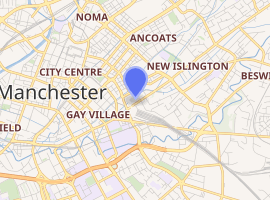Piccadilly Tower
The Piccadilly Tower (Eastgate or Inacity Tower)[1] is a proposed development designed by Woods Bagot[2] in Manchester city centre, England and could rise again.
| Piccadilly Tower | |
|---|---|

| |
| General information | |
| Status | Proposed |
| Type | Residential, hotel and car parking |
| Location | Manchester |
| Coordinates | 53°28′42.96″N 2°13′50.88″W |
| Construction started | 2008 (on hold since mid-2008 and still on hold) |
| Estimated completion | Unknown |
| Opening | Unknown |
| Cost | £220 million[1] |
| Height | |
| Roof | 188 m (617 ft)[2] |
| Technical details | |
| Floor count | 58[1] |
| Design and construction | |
| Architect | Woods Bagot[2] |
| Developer | Ballymore Group[1] |
History
The developer proposed to build a 58-storey, 188 m (617 ft) skyscraper.[2]
The tower would have 420 residential units and a 220-bed hotel,[1] as well as a fitness centre, conference facilities, restaurants and bars.[3] New public walkways would be constructed along the Ashton Canal adjacent to the site.[2] Three underground floors would provide car parking for residents through an NCP public car park. A 17-storey "East build" section would comprise retail/commercial/residential space.[3]
The site, a car park on a railway viaduct to the rear of Piccadilly Station[4] between Store Street and Ducie Street was purchased by Inacity for £14 million in 2003.[5] The planning application was submitted in 2004[6] and was approved in March 2005.[1] The cost of the development is around £220 million.[1]
The project was a joint venture between Inacity and Merepark, but has been sold to Irish property developers Ballymore Group, with Inacity retaining a small share. It will be Ballymore's first development in Manchester.[1][7]
Groundwork started in January 2008,[8] to be completed in August 2008. The work consisted of demolishing eight viaduct arches, redirecting a sewer, and constructing a 19 m deep concrete retaining wall to the north, where the site is adjacent to a canal.[9]
On 8 September 2008 Inacity announced the project was on hold due to the financial crisis of 2007–2010, and construction would not resume until the economy stabilised. The site was converted back to a carpark.[10]
As of 2018, the site is still owned by original developers Ballymore. The site is currently used as a car park. Ballymore has objected to numerous developments nearby, such as the renovation of Gateway House, which would block access to Piccadilly station, suggesting the scheme is still alive – at least as a proposal.[11]
- The site for Piccadilly Tower in February 2008 (facing south)
.jpg) The site of Piccadilly Tower in April 2008
The site of Piccadilly Tower in April 2008- Proposed height of the completed Piccadilly Tower, compared to the height of other existing and approved tall buildings in Manchester.
References
| Wikimedia Commons has media related to Piccadilly Tower, Manchester. |
- Barry, Chris (13 September 2007). "Piccadilly Tower Boost". Manchester Evening News. Retrieved 2008-02-17.
- "Piccadilly Tower, Manchester". Emporis. 2008-02-17.
- "Inacity Tower Official Website". Retrieved 2008-02-18.
- "Building – 331 – Piccadilly Tower – Manchester". SkyScraperNews.com. Retrieved 2008-02-17.
- "Ballymore targets 620ft Eastgate Tower development in Manchester". Irish Times. 12 September 2007. Archived from the original on May 21, 2008. Retrieved 2007-02-17.
- "News: 60-storey proposal for gateway site in Manchester". 13 December 2004. Retrieved 2008-02-17.
- "Inacity Sell Manchester Tower Plan To Ballymore". SkyScraperNews.com. 30 August 2007. Retrieved 2008-02-17.
- "Work Starts On Piccadilly Tower". SkyScraperNews.com. 29 January 2008. Retrieved 2008-02-17.
- "Work Starts On Piccadilly Tower". birsecl.co.uk. 26 March 2008. Archived from the original on 18 May 2008. Retrieved 2008-03-26.
- "Wayne Mellor Announces Piccadilly Tower Hold". Skyscrapernews.com. 2008-09-08. Retrieved 2008-09-08.
- "Gateway House" (PDF). Manchester City Council. 17 January 2013. p. 2. Retrieved 2013-03-31.